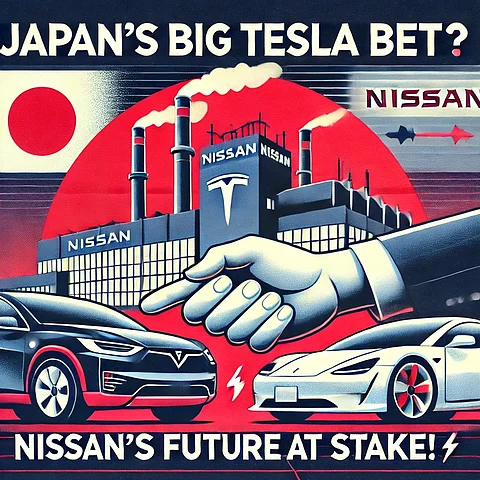
- Home
- Career Counseling
- Bharat
- Editorials
- Research
- Religion and Culture
- Corporate (Business News )
- State News Update
- Crimes News
- Education News
- Property News
- mocktest
- Life Style

In a significant development within the automotive industry, a high-level Japanese consortium, including former Prime Minister Yoshihide Suga and ex-Tesla board member Hiromichi Mizuno, has proposed that Tesla invest in Nissan Motor Co. This initiative follows the recent collapse of merger discussions between Nissan and Honda Motor Co., which aimed to create a $60 billion automotive giant.
Background of the Proposal
The proposed Tesla-Nissan partnership is seen as a strategic move to safeguard Nissan from potential hostile takeovers, particularly by companies like Foxconn. The consortium believes that Tesla's involvement could rejuvenate Nissan's operations, especially by utilizing its underutilized manufacturing plants in the United States. These facilities, located in Tennessee and Mississippi, have a combined capacity of producing one million units annually but are currently operating below this threshold.
Elon Musk's Response
Despite the consortium's efforts, Tesla CEO Elon Musk has downplayed the possibility of such an investment. In response to the reports, Musk stated that Tesla is not interested in acquiring Nissan's U.S. plants. This stance suggests that, for now, Tesla is focusing on its existing operations and expansion plans without integrating Nissan's assets.
Implications for Nissan
The collapse of the merger talks with Honda and the uncertainty surrounding Tesla's potential investment place Nissan in a precarious position. The company has been grappling with declining sales and financial challenges, leading to restructuring efforts, including job cuts and factory closures. Moody's recently downgraded Nissan's credit rating to junk status, reflecting concerns about its financial health.
The Japanese government's involvement underscores the national security concerns associated with potential foreign takeovers, especially by entities perceived to have close ties with China. Former Prime Minister Suga's support for the Tesla investment proposal highlights the strategic importance of maintaining domestic control over key automotive assets.
Industry-Wide Repercussions
The automotive industry is undergoing a transformative phase, with traditional automakers facing intense competition from electric vehicle (EV) manufacturers like Tesla and emerging Chinese companies. The failed merger between Nissan and Honda was initially seen as a strategy to consolidate resources and enhance competitiveness in the EV market. With that option off the table, Nissan must explore alternative alliances or strategies to remain viable in the rapidly evolving automotive landscape.
In summary, while the Japanese consortium's proposal for Tesla to invest in Nissan reflects proactive measures to secure the automaker's future, Elon Musk's current lack of interest suggests that Nissan will need to identify other avenues to address its financial and operational challenges.
The mainstream media establishment doesn’t want us to survive, but you can help us continue running the show by making a voluntary contribution. Please pay an amount you are comfortable with; an amount you believe is the fair price for the content you have consumed to date.
happy to Help 9920654232@upi
